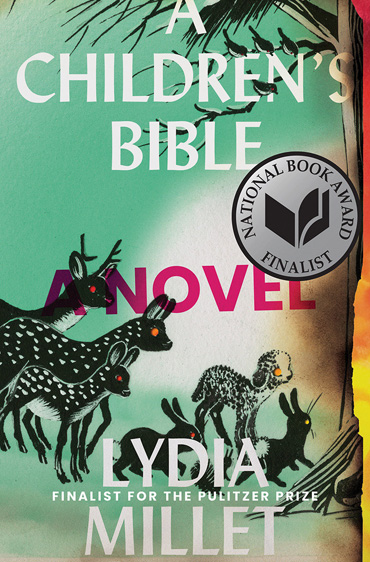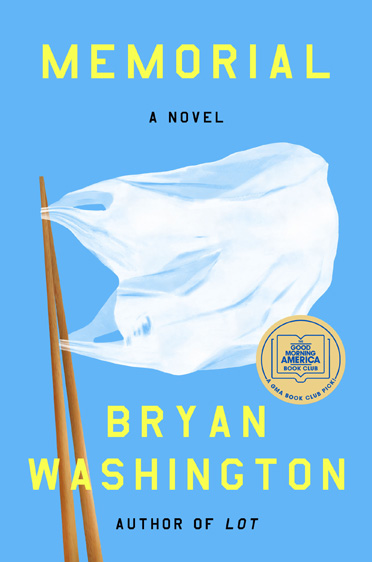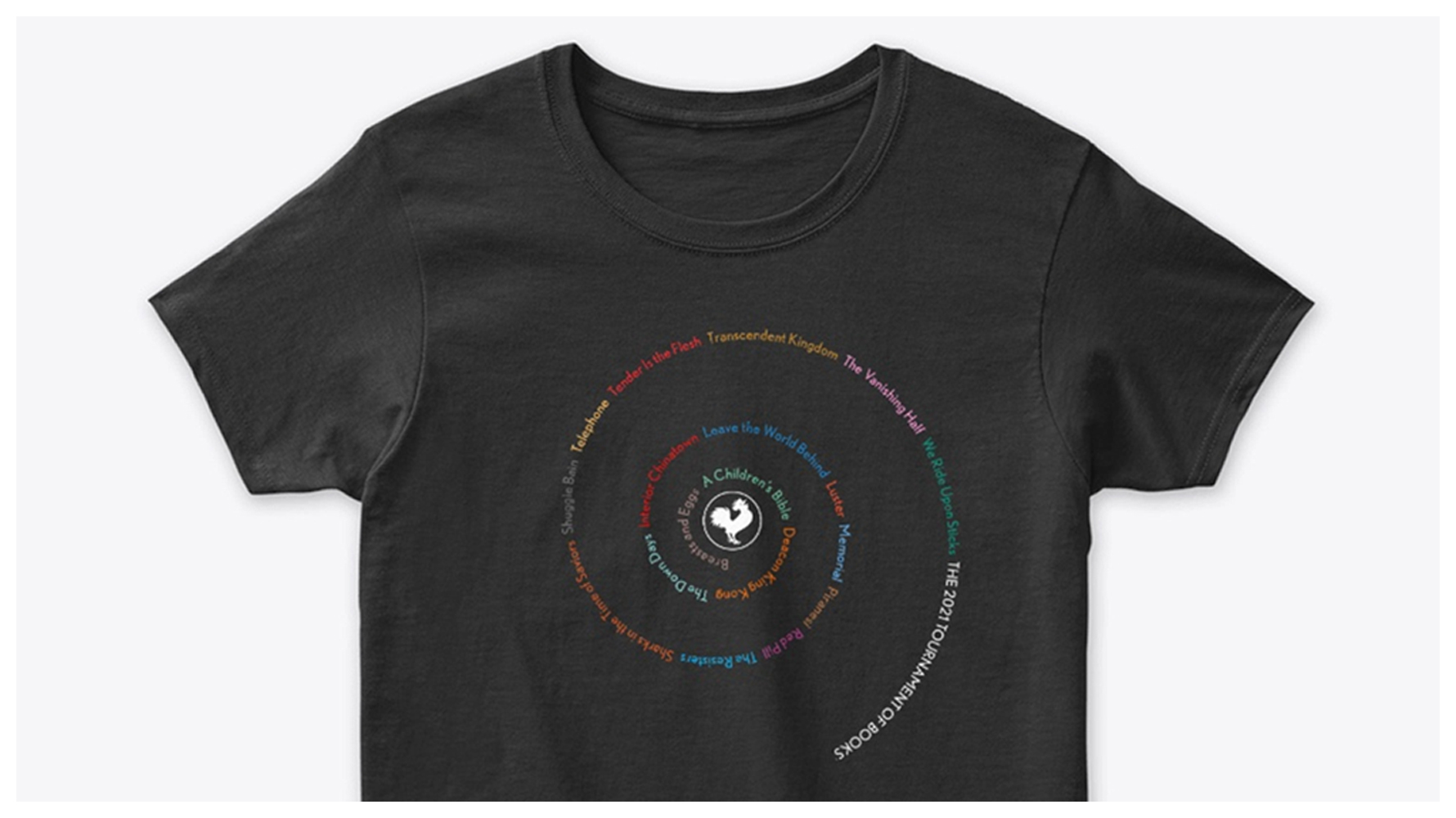-
March 10, 2021
Opening Round
-
Lydia Millet
2A Children’s Bible
v.
3MemorialBryan Washington
-
Judged by
Alexandra Schwartz
Allow your honest judge to declare her biases at the top. I don’t love dystopia. Actually, I mostly don’t even like it. Technological surveillance, natural apocalypse, brutal class stratification, internecine warfare: These are all things that we have more than enough of on present-day Earth, which, in my opinion, is a great place to set a novel. A lot of writers and filmmakers and such see dystopia as a proving ground for their talents, a way to flaunt their imaginations’ direst workings, but not everyone can be a Cormac McCarthy. Remember that Matt Damon movie Elysium, where the big idea was that, a hundred years in the future, humanity is divided between the ultrarich who live in space and the rest of us who sling it out in an ecologically poisoned garbage dump that used to be Los Angeles? I don’t know if you’ve walked down 57th St. lately but let me tell you: That future is already here. Anyway, this is to say that if left to my own devices I would probably not have chosen to read Lydia Millet’s novel A Children’s Bible, whose jacket copy promises “apocalyptic chaos,” “scenes of devastation,” and “eerily mature children”—all phrases, as Google probably knows, that are algorithmically unlikely to make me click.
That is why we should not entrust algorithms to choose our novels for us. A Children’s Bible is excellent—dark, funny, unflinching. The book opens in the first-person plural (“Once we lived in a summer country”; “We found the skull of a dinosaur”), a mythical voice that suggests a future where individuality has been eroded and beings formerly known as human speak as a lumpen, robotic mass. The novel, however, turns out to have a single narrator, Evie, a teenager who is spending an unwilling summer at a big lake house somewhere on the East Coast that her parents have rented with a group of old friends from college. There are 12 kids in the house, ranging from prepubescent to near-grown, and they quickly form a private society. Its core principle is opposition to the parents, who spend their days getting drunk or waiting to get drunk, and whom the kids justifiably consider to be a disgusting embarrassment. The kids play a game whose object is to guess which parents belong to which child. There are no good options, but it’s a special humiliation to be identified with the particular grotesquerie who begot you.
In this novel named for The Good Book, trouble comes, as it came to Noah, in the form of a flood. The house is inundated; the parents respond by getting drunker, taking MDMA, and having an orgy while the kids elect to sleep outside in an improvised tree house—not the safest place to weather a world-historical storm, but we are in a slightly parallel realm, touched by a kind of magical suspension of the real. (Why did so many teenagers agree to spend a whole summer with their parents, anyway? Shouldn’t they be building out their résumés for college applications or getting high? Maybe it’s a Gen Z thing.) As word of society’s impending collapse trickles in, the children commandeer their hopeless parents’ cars and take off to seek safety on their own.
The symbolic framework of A Children’s Bible is not hard to decode if you have basic literacy in both testaments. There’s the name “Evie,” and a group of adults called “angels” who leave food for travelers on the Appalachian Trail and help care for the kids. When the waters come, Evie’s adored little brother traps animals to save them from destruction. A child is born in a barn; a man is crucified. God appears as an older woman in a trench coat who can only be played by Tilda Swinton in the movie. At the same time, the novel insists on the present. The kids have smartphones; characters consult the Weather Channel and mention McDonalds and Chez Panisse. Millet wants us to know that this is our world and our catastrophe. She is a master of pacing; the novel floats by in blunt beats, its short sections separated by fermatas of white space. Sentences are declarative, dialogue is clipped:
“What’s that?” asked Low, pointing out the broken window to the wide lawn beyond.
“Light, please,” said a mother, and flashlights pointed.
“It’s shiny,” said Jack.
“It’s water,” said a father.
“The lake is in the yard,” said Jack.
There was water all around.
The failure of the adults—their idiocy, their selfishness, their obsession with their own pleasure at the expense of all responsibility—is the starkest thing about the book. It is unconditional, absolute. It is also strange. What happened to those notorious helicopter parents, the kind who call the school to yell at the teacher and drive to their kids’ colleges to do the laundry? These ones seem straight out of the ‘50s, all cocktails and neglect. But this, too, is a kind of symbolism. Millet is 52, and I think that she is damning, in the harshest terms, her own generation’s inability to protect the next by confronting climate change. The awful parents embody what even nice, attentive ones are said to be guilty of: despoiling the planet for their own enjoyment, the future be damned. Greta Thunberg would approve this message. For me, it’s a little too neat. A Children’s Bible is a parable; its moral is that the kids will save us. That’s never felt right to me as a political message, and it doesn’t feel more satisfying as a novelistic one.
There’s a full range of Note Books and related stationery products at fieldnotesbrand.com. Field Notes is proud to once again be a sponsor of the Tournament of Books.
Memorial is set in the recognizable present, in Houston and Osaka, and its characters are concerned with the things that characters in realist novels are concerned with, namely sex, love, and money. That is why I was so surprised to find, from the first page, how many thematic and stylistic similarities Memorial shares with A Children’s Bible. It, too, is a story of estranged parents and children, told in short, breathing beats, which—if you will permit a food metaphor to describe a book that delights in culinary descriptions—are to this novel what air pockets are to a schnitzel, a way to keep a dense substance light.
I interrupt this program for a word on such beats in contemporary fiction. Ever since Jenny Offill’s Dept. of Speculation (2013), it has become very popular to tell a story in discrete paragraphs framed in white space, like pictures on an art gallery wall. (Memorial, in fact, includes photographs.) This is an associative style, where juxtaposition is the thing, and it frequently drives me crazy; like overspiced food, it tends to cover a lack, to give an unearned sense of significance and connection between things that may be neither. But the style—or the variation of it that Washington uses—works beautifully in Memorial. It is the right strategy for a novel that is, in large part, about blockages in communication, the crust of silence that can form over things too painful to discuss. Many of its characters’ problems would go away if they could just say “I love you,” and that is why they are so hard to solve.
The novel, told in three sections, begins and ends with Benson, a daycare worker who lives with his boyfriend, Mike, a chef. Benson is Black, a Houston native. Mike immigrated with his parents to Texas from Japan when he was young. Now, his estranged father is dying of cancer in Osaka, and Mike has decided to visit him, though the timing could not be worse; on the very day that he leaves, Mike’s mother, Mitsuko, arrives from Tokyo for a visit, and Benson, who has never before met her, is stuck with an unwanted roommate. Mitsuko is mean. She’s always sniping at Benson, rubbing in the failure of his and Mike’s romance: “Remember, says Mitsuko, you’re the one who let him leave.” (Washington doesn’t use quotation marks for his dialogue.) Mitsuko has some cause; the relationship isn’t functional—we hear about Mike’s infidelities and Benson’s violent rages—but neither man understands how to improve it or to let go.
Benson, meanwhile, has his own family problems. His parents split up years ago, and though his mother has remarried, his father, an alcoholic, is in alarming decline. Benson’s narrative voice is like a shrug, and the novel cannily enacts the posture of indifference that he has adopted to conceal his longing—for what, he hardly knows himself. Subtly, wounds from the past bubble up beneath the surface of daily life. There is Benson’s father’s hostility to his gayness, not to mention Benson’s damaged sense of his own sexuality, which is both relieved and amplified by his relationship with Mike. Their relationship is touched by a complex racial dynamic, the men joined in wary consciousness of their difference in white society but not entirely able to let down their guards in each other’s company. (The novel intelligently explores the ways that a categorical sense of “identity”—racial, sexual, national, and so on—does and doesn’t help people make sense of themselves.) These young men, groping instinctively toward domesticity, have no domestic model to work with—not because they are gay, as might have been the case in the past, but because neither has the ability to imagine what a happy family might look like.
Mike narrates the second section, which begins with his trip to Osaka, his tone hot to Benson’s studied cold. It is wonderful to discover that this wise, feeling novel doesn’t use Mike’s perspective to glibly “correct” Benson’s, but rather allow its second protagonist’s consciousness an equal airing. What we had seen, through Benson’s eyes, as Mike’s cruelties and indifference now take on a different cast as he begins to try to reconcile with his father, Eiju, a brusque but spirited asshole who runs a bar that he hopes Mike will take over for him after he’s gone. (There is some nice sitcomish comedy in the bar scenes, which feature a voluble cast of regulars getting sloshed.) It’s not a spoiler to say that Eiju dies, because we learn of his death at the end of the first section; by going back in time to show us his final weeks through Mike’s eyes, Washington disposes of the distraction of suspense while deepening the emotional plot. This is a very tricky move to pull off, but when it succeeds, as it does here, it is profound. Without imposing a sense of artificial emotional closure, Memorial proposes that familial failure—that failure in general—need not be absolute; it recognizes that the human condition is a mess, but holds out real hope that change is possible. Cher once asked if we believe in life after love, to which Memorial answers: What other choice do we have?
That patient faith in the human is why I ended up preferring Memorial to the hard, allegorical diamond of A Children’s Bible. Millet, too, ends her novel in a place of hope; the rainbow must follow the flood. Salvation comes to her child heroes much as destruction did, an external force to which they submit and adapt. The species may survive—but the individual has gone missing. The Bible itself is great literature because, time and again, its characters prove themselves to be people: frail, foolish, blind, proud. Lot’s wife turns back to look at what she isn’t supposed to see. Abraham argues for the salvation of irredeemable sinners. Moses gets mad and smashes the Ten Commandments. (As for Noah, after the whole ark ordeal he plants a vineyard, gets drunk on his own wine, and puts a curse on the head of the son who discovers him passed out in his tent naked.) The best novels work through the specific to give us new knowledge of the human mind and the human heart, and that is what Memorial does, in its digressive, impressionistic way. Often, you want to shake Benson and Mike by the shoulders, tell them to get out of their sad, suffering heads, stop all the fighting and living-room-floor-hate-fucking, look each other in the eyes, and agree to go to couple’s therapy. And that is more or less what the novel does (mercifully without the therapy) in its third section. It works, in both human and literary terms. It is the end of the book, but it feels like a new beginning.
Match Commentary
By Jason Jefferies & Andrew Womack
Andrew Womack: Throughout this year’s Tournament, we’re inviting booksellers from some of our favorite stores around the country to join us here in the commentary booth. Today we’re excited to have Jason Jefferies of Quail Ridge Books with us!
Hello, Jason! How have you been, and can you introduce yourself to the readers?
Jason Jefferies: Hi, Andrew. First, let me say how happy I am to be doing this. I have been following the Tournament of Books for the entirety of its existence, and can’t believe I am now in this position. Anything is possible!
I am typing in from Raleigh, NC, where I am the General Manager at Quail Ridge Books. I am also the co-owner and co-director of the North Carolina Book Festival, and the host of the podcast Bookin’.
Andrew: Thank you for being here. Tell us, what are your tastes as a reader? Anything you’re loving at the moment?
Jason: I love almost everything. Some of my recent favorites are The Hare by Melanie Finn (Two Dollar Radio), Aubrey McKee by Alex Pugsley (Biblioasis), At the Edge of the Haight by Katherine Seligman (Algonquin), ELADATL by Sesshu Foster and Arturo Romo (City Lights), and If I Had Two Wings by Randall Kenan (Norton).
Andrew: Well let’s get started! What did you think of today’s judgment?
Jason: I was in agreement with the judge, for sure. As a bookseller, both of these books have been on my radar, of course, Bryan Washington’s especially, because we had signed copies to sell. While I appreciate the heavy-handedness and biblical allegory in A Children’s Bible, I think Memorial is ultimately more human, and this is what I, as a reader, need one year into the Covid era, though prior to 2016, my personal tastes may have leaned more toward A Children’s Bible. Plus, as Alexandra mentioned, Memorial is stylistically similar to Jenny Offill’s Dept. of Speculation, one of Quail Ridge Books founder Nancy Olson’s favorite recent books, and one of mine as well. Something about this sparse sense of structure really speaks to me.
What about you? Were you persuaded?
Andrew: I appreciated how Judge Schwartz led with her distaste of dystopia. Personally, I’m a sucker for dystopia—in entertainment, that is, not the actual dystopia we’ve been living through. But her mention of Elysium right at the top was a very efficient reminder of just how hackneyed so much of it can be. She gives A Children’s Bible its due, but from the outset we know this is going to have to be a very different kind of dystopia to win this matchup.
What about you? Are you partial to dystopia?
Jason: It depends. Like anything else, some are much better than others (Yes, I love dystopias! seems like a strange sentence to write). I love The Road. Station Eleven was good. The Four Fingers of Death by Rick Moody is supremely underappreciated. It seems that not many weeks go by without a reference to 1984 and Brave New World. Never Let Me Go by Kazuo Ishiguro is one of Quail Ridge Books owner Lisa Poole’s favorite books, and I look forward to reading Klara and the Sun.
I think more than dystopias, I am a fan of reading a novel that contains the sort of brooding sense of doom that many well-written dystopias carry with them—2666 by Roberto Bolaño comes to mind, or anything written by William T. Vollmann.
I am interested to see how the dystopian novel changes, considering the current environment. I recently finished reading Jim Shepard’s excellent new novel Phase Six (to be released in May), which is the first dystopian novel I have read that deals with Covid-19 specifically and explicitly. I know there are many more coming.
I guess the question I have for you, Andrew, is where does the dystopian novel go after 2020?
Andrew: Maybe it could come down to near- versus far-future, and how open readers are to seeing themselves or their immediate descendants existing in that dystopia. That is, are we feeling more The Postman or Waterworld? Or, let’s face it, neither?
Along the same lines as when a story takes place, though, might be where it exists in terms of an apocalyptic event, which I think offers a comforting buffer between the frightening now and the speculative then. And while we’ve been talking about the dystopian nature of our present moment, I also wonder how dystopian our present era might seem to a writer 50 or 60 years ago.
Jason: I feel like many writers 50 or 60 years ago (Toni Morrison, a younger Joan Didion, Hunter S. Thompson, a younger Thomas Pynchon, Malcolm X, and Philip K. Dick to name a few) would probably see our current era as slightly dystopian and also not surprising in the least.
Andrew: So we’re right on track. Great. How has bookselling been different during the pandemic? What do the months ahead look like for your community?
Jason: Hopefully the months ahead for our community look like a quick and efficient distribution of a working vaccine with little to no mutation of Covid so we can begin to heal and come back together in person. I hope to see our major local universities prioritizing the health and safety of their staff, faculty, and students over short-term profits, and I hope to see enforcement of the statewide ordinances that were put into place to keep people safe.
Bookselling is the same, but different. We decided to shut our doors to the public for several weeks beginning in March 2020. We created an online streaming platform (QRB-TV) so our customers can stream our virtual author events on-demand when they aren’t able to be in front of their computers at a specific time, and we have been offering an author interview every week on our podcast Bookin’. Mostly, this time has just reminded me how nimble and resilient readers and booksellers are. Every day has brought a different challenge, and this fantastic community of readers has supported indie bookstores as we adapt. Thank you, thank you, thank you!
Andrew: Final question: As a bookseller, what did you think of Judge Schwartz’s line, “That is why we should not entrust algorithms to choose our novels for us?”
Jason: I agree that we should not let algorithms choose our novels for us, but my answer is a bit more nuanced. When The Long Tail was published several years ago, I think we all knew this algorithm-heavy future was the future we were heading toward, though many of us booksellers put our heads in the sand. And I may ruffle some feathers by stating that I think algorithms are valuable and do have their place, especially when navigating a site like Bandcamp where almost every artist is unpublished and unknown outside of their hometowns, but many of them are talented enough to become future favorites if given the opportunity. But regarding books, there is nothing like browsing a bookshop, reading handwritten recommendations and staff favorites, picking a book up off the shelf, flipping through it with your hands, seeing the cover in person, and making a purchase that stimulates and supports your local economy (or someone else’s local economy). There is no substitute for that experience, and no algorithm will ever be able to replace it.
Andrew: Hear hear! Down with the bookselling dystopia!
And with that, I think we’re ready to wrap it up. Thank you, Jason, for joining us today. Kevin and John will return to the booth tomorrow as Felicia Davin chooses between Yaa Gyasi’s Transcendent Kingdom and Quan Barry’s We Ride Upon Sticks. We’ll see you then!
New 2021 Tournament of Books merch is now available at the TMN Store. As a reminder, Sustaining Members receive 50 percent off everything in our store. To find out why we’re asking for your support and how you can become a Sustaining Member, please visit our Membership page. Thank you.
Welcome to the Commentariat
Population: You
To keep our comments section as inclusive as possible for the book-loving public, please follow the guidelines below. We reserve the right to delete inappropriate or abusive comments, such as ad hominem attacks. We ban users who repeatedly post inappropriate comments.
- Criticize ideas, not people. Divisiveness can be a result of debates over things we truly care about; err on the side of being generous. Let’s talk and debate and gnash our book-chewing teeth with love and respect for the Rooster community, judges, authors, commentators, and commenters alike.
- If you’re uninterested in a line of discussion from an individual user, you can privately block them within Disqus to hide their comments (though they’ll still see your posts).
- While it’s not required, you can use the Disqus <spoiler> tag to hide book details that may spoil the reading experience for others, e.g., “<spoiler>Dumbledore dies.<spoiler>”
- We all feel passionately about fiction, but “you’re an idiot if you loved/hated this book that I hated/loved” isn't an argument—it’s just rude. Take a breath.




